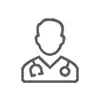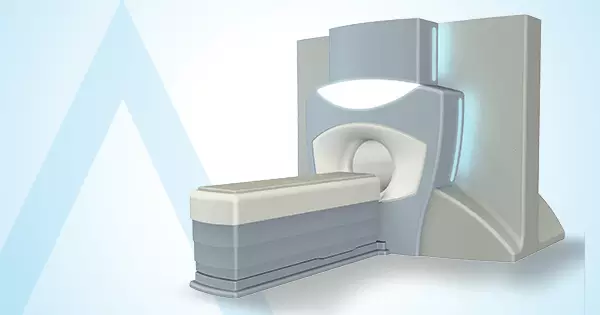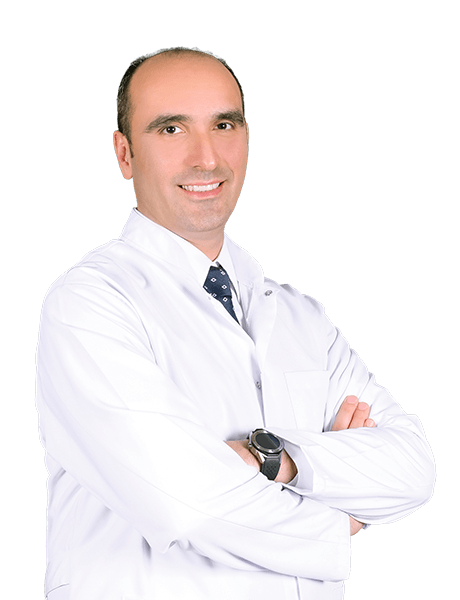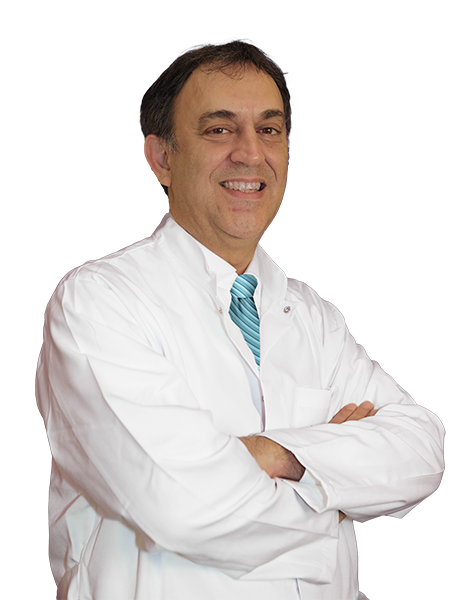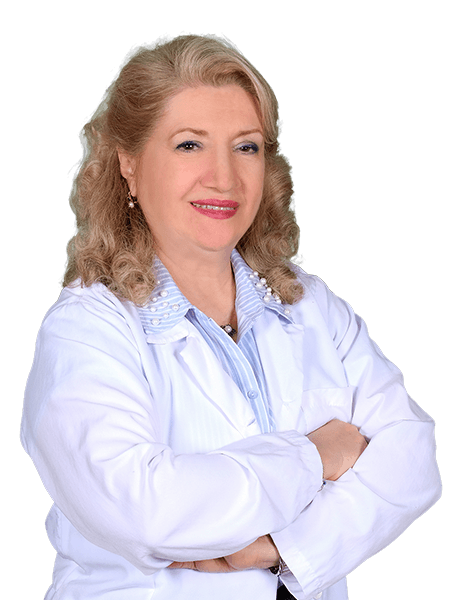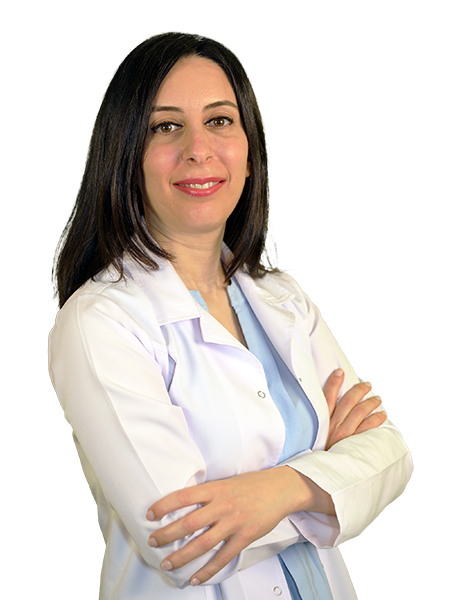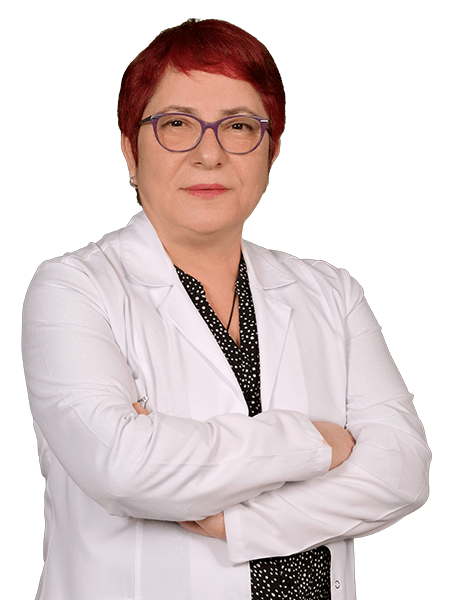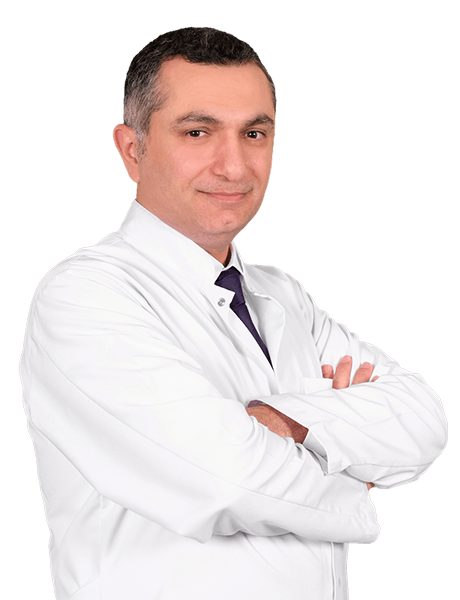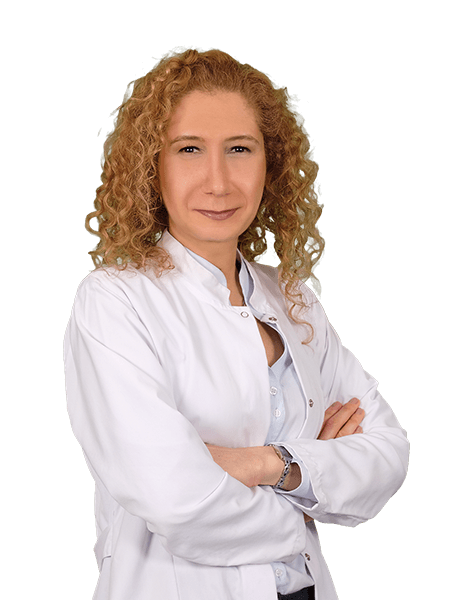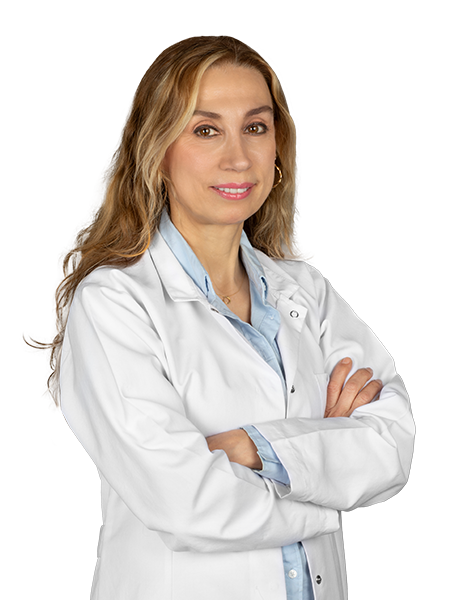Crohn’s disease and ulcerative colitis are chronic and recurrent diseases of gastrointestinal tract. Generally, they are called inflammatory bowel diseases.
Acıbadem Healthcare Group provides patients with Crohn’s disease and ulcerative colitis with inpatient and outpatient diagnosis and treatment services through multidisciplinary approach by a team of gastroenterologists, radiologists, pathologists, general surgeons and nurses.
Diagnosis and Treatment Services for Crohn’s Disease and Colitis
Crohn’s disease is a chronic condition that is characterized with inflammation of digestive tract and ulcers. Although it may involve any part of the digestive system, including mouth to anus, it most commonly involves terminal portion of the small intestine and colon. It is a long-standing, chronic but a treatable disease.
How is Crohn’s Disease diagnosed?
The disease can be diagnosed through personal history, physical exam, laboratory tests and visualization of small intestine and colon. Stool test and blood analyses are essential. Colon and terminal portion of small intestine can be visualized thoroughly with an optic and flexible device, namely colonoscope. Since interior lining of the gastro-intestinal tract has no sensation of pain, biopsy specimens can be collected from the involved segments, but patients feel nothing. The diagnosis can be established through assessment of biopsy specimens under microscope regarding pathological features. Moreover, radiologic study of the small intestine helps diagnosis of the condition along with computerized tomography and magnetic resonance imaging (MRI).
How is Crohn’s Disease treated?
Treatment of Crohn’s Disease is planned depending on the severity and the involved body part (intestines, colon, anus, etc.). The treatment usually starts with oral medication and enemas.
Ulcerative Colitis
Ulcerative colitis is an inflammatory bowel disease that develops in the innermost lining of colon. The lesion or ulcers typically develop at the terminal segment of colon, namely rectum, in 95% of patients and they spread to proximal end of the colon. Signs of ulcerative colitis and severity of symptoms may vary depending on the location of ulcers.
How is Ulcerative Colitis Diagnosed?
Ulcerative colitis is a disease that may intermittently exacerbate followed by asymptomatic period. Signs of the disease and severity of symptoms vary depending on the location of ulcers. Bleeding in colon and accompanying diarrhea or constipation should create a high index of suspicion for ulcerative colitis, if such symptoms are accompanied by abdominal pain. Diagnostic phase requires stool test, colonoscopy, intestinal mucosa biopsy and intestinal X-ray.
How is Ulcerative Colitis treated?
As is the case with Crohn’s disease, medication treatment is usually the first-line treatment option for ulcerative colitis. However, one should always remember that these medications have side effects and that they should not be used for long time and medication therapy should be planned very carefully for young patients. The option of surgical management is considered, if there is no response to long-term medication treatment.
Can Patients with Inflammatory Bowel Disease (IBD) Have Children?
Yes, the patients with inflammatory bowel disease (IBD) can have babies. However, patients with IBD who plan to give birth to a baby should decide to conceive in the inactive period of the disease. Although it is known that fertility decrease in active period of the disease, it is possible to conceive. However, the unplanned pregnancy in such patients should be supervised by a physician.
The disease may transform into inactive state in response to medications used by patients with inflammatory bowel disease. On the other hand, these medications may have hazardous side effects on an unplanned pregnancy. Therefore, the patients who wish to become pregnant while on treatment of IBD or others with unplanned pregnancy should strictly follow advices and instructions of their doctors.
How Much Does Inflammatory Bowel Disease Affect Fertility?
Women with ulcerative colitis are usually as fertile as healthy women. The answer to questions regarding fertility for patients with Crohn’s disease is not as clear. Since total colectomy and ileo-anal pouch surgery are performed which imply total removal of colon and anastomosis of small intestine to anal canal in the form of a pouch, respectively, for treatment of ulcerative colitis, this major operation may cause decrease in fertility, but it is a temporary or reversible condition.
The fertility recovers within weeks or months. On the other hand, fertility often decreases in active phase of Crohn’s disease and following major surgeries. Excessive and rapid weight loss, which can be seen in active phase of both conditions, may cause amenorrhea (absence of menstruation).
Patients are recommended to postpone pregnancy until optimal conditions are met, when the disease follows a very severe course; necessary time is allowed for surgical scars to heal and for cessation of active phase. It should also be remembered that decreased fertility in patients with IBD is not always caused by the disease and therefore, other potential etiologies should be investigated.
How Does Inflammatory Bowel Disease Affect Fetal Health in Pregnancy?
It is demonstrated that approximately 85% of women with IBD face no abnormality in pregnancy. Congenital anomalies are seen in approximately 1% of babies of women with Crohn’s disease or ulcerative colitis.
Usually, the risk of miscarriage does not increase. These rates are similar to rates reported for healthy women. In fact, problems or complications which are related to pregnancy or affect fetal health are valid for approximately 15% of cases.
However, rate of abortion, premature birth and other gestational complications increases drastically, if a woman conceives in exacerbated phase of the disease. Active phase of the disease should be treated, if possible, before the conception. For example, if it is known that surgery will be needed in near future, it should be performed before the patient gets pregnant.
Do People with Inflammatory Bowel Disease Need To Have Tests Before Pregnancy?
Detailed discussions of medical history, existing overall health and potential nutritional deficiencies with the physician who will supervise the pregnancy as well as laboratory tests that will determine the activity of disease are strongly advised for patients with inflammatory bowel disease before a planned conception.
Evaluation of abdomen and bowel with ultrasound by an experienced doctor can also provide valuable information. Some patients may need further tests and examinations, including endoscopy and radiology studies, at a more comprehensive facility.
Since folic acid supplementation in first several months of pregnancy is beneficial for baby, it can be recommended for all women with or without IBD. However, sulfasalazine or sulfapyridine will likely reduce intake and metabolism of folic acid.
Can Patients With History of Surgical Treatment for Inflammatory Bowel Disease Get Pregnant?
Surgical management of inflammatory bowel disease does not usually affect the course of pregnancy. Even after major bowel surgery such as colectomy (removal of colon) or ileostomy, pregnancy can be completed without complication.
However, the important point is to allow sufficient time for wound healing between the operation and the conception and to ensure that there is no significant disease activity. It is generally advised to wait for a year before pregnancy following major abdominal surgeries. Rarely, ileostomy related complications (e.g. obstruction, prolapse, bleeding) are likely in pregnancy.
Certain cases may necessitate surgery during pregnancy, although it is very rare and the risk of premature birth or miscarriage is very low in patients who are operated on. On the other hand, there are documented pregnancies without any complication in patients with ulcerative colitis who are undergone major surgeries, including total colectomy (total removal of colon), due to lack of response to medication treatment.
How Does Pregnancy Affect Course of Inflammatory Bowel Disease?
Mostly, pregnancy does not affect the activity of IBD or maintenance of remission. However, IBD may recover dramatically or on the contrary, symptoms aggravate in some cases. If the disease is in active form at the beginning of pregnancy, the active form of the disease persists almost throughout the pregnancy in one third of the patients.
Exacerbation of disease is more common in the first trimester and in puerperium. In both Crohn's disease and ulcerative colitis, the risk of exacerbation during pregnancy is similar to the rate of activation in non-pregnant patients with IBD in the ordinary course of the disease.
Episodes of disease in pregnancy usually respond to treatment well. Medications can help reduction of activity and the resultant remission phase can be maintained throughout the rest of pregnancy. Moreover, it should be noted that exacerbated symptoms of inflammatory bowel disease in pregnancy does not imply similar exacerbation episodes in future pregnancies.
Both Crohn’s disease and ulcerative colitis can show the initial symptoms during pregnancy. Generally, course of inflammatory bowel diseases in these patients are not more serious than patients who are not pregnant; however, complaints and need for medications cause concerns in pregnant woman and her family. Pregnant woman and her relatives should be informed in detail about this issue.
May Drugs Used for Treatment of Inflammatory Bowel Disease in Pregnancy Harm the Baby?
Every pregnant woman refrains from and should normally abstain from medications. However, since active IBD disease can be more harmful for baby than side effects of medications, it may be necessary to take medicines in pregnancy.
However, a personalized treatment should be planned through consultation with other physicians, if necessary, and only the necessary medications should be prescribed. Every pregnant woman with IBD should be clearly informed that only 85% of pregnancies are complication-free even for healthy people.
It should be remembered that inflammatory bowel diseases are more harmful for both baby and mother than medication therapy, if it is not treated properly. Briefly, medication therapy should be prescribed for pregnant women, only if absolutely necessary.
Should Patients with Inflammatory Bowel Disease Stop Medication Treatment in Pregnancy?
It is recommended to stop certain drugs that suppress the immune system, such as azathioprine (Imuran) and 6-mercaptopurine, 3 months before planned pregnancy. If patients have concerns about exacerbation of disease after cessation of such medicines, primary physician of the patient should be contacted to weigh risks against benefits before making a decision on whether the medications are stopped or not; moreover, a patient who takes one of these medicine may accidentally get pregnancy and in such cases, pregnancy should be supervised very closely.
Up-to-date literature reports that usual doses of various corticosteroid agents commonly used in treatment of inflammatory bowel diseases do not pose an increased risk for baby; if remission is achieved with these medications, it is not necessary to stop them, when a patient with IBD gets pregnant. As it is known that 5-ASA agents do not cause aspirin-independent increase in the risk of bleeding, they are not required to be stopped due to risk of bleeding.
Use of some medications is not recommended in pregnancy and patients are advised to get pregnant at least three months after such drugs are stopped. On the other hand, many pregnant women who took these medications in their pregnancy gave birth to healthy babies and therefore, current evidences do not support a certain indication for termination of pregnancy in mothers who have used these drugs.
Can Patients with Inflammatory Bowel Diseases Use Drugs in Lactation?
It is acknowledged that doses of corticosteroid agents prescribed for treatment of IBD do not increase risk of any fetal anomaly or do not lead to miscarriage. However, it can be theoretically mentioned that use of too high doses of these drugs in last trimester of pregnancy may cause apathy, decreased activity and low corticosteroid levels by suppressing synthesis of corticosteroids in adrenal glands of the newborn infant and therefore, this risk should be notified to the primary physician of the newborn infant.
Physician should be warned and therefore, these newborn infants should be followed up by a specialized physician. As cortisone passes to newborn infant from breast milk, same condition applies to lactation. In both cases, recovery is achieved without any complications after use of cortisone is stopped.
Is It Necessary to Terminate Pregnancy If Mother Has Inflammatory Bowel Disease?
It is required very rarely or never to terminate pregnancy due to documented inflammatory bowel disease in mother. Instead of terminating the pregnancy, inflammatory bowel disease of women should be properly treated and additionally, physicians should start a comprehensive care.
Which Diagnostic Methods of Inflammatory Bowel Disease Can Be Used In Pregnant Women?
Abdominal ultrasound can be scanned both for supervision of pregnancy and for IDS and it is absolutely harmless for mother and baby. Gastroduodenoscopy or colonoscopy (rectoscopy, sigmoidoscopy and even ileo-colonoscopy) can be safely performed in pregnant women, provided it is required or absolutely indicated and performed in 2nd trimester of pregnancy by a specialized physician under mild sedation, if possible.
Potential gains should be carefully weighed against risks in first and last trimesters. However, these methods should be considered when they are absolutely necessary to determine the most appropriate treatment method. Magnetic resonance imaging (MRI) can also be preferred for some cases, which is probably harmless. Diagnostic procedures that require exposure to radiation (tomography, X-rays) should be postponed until birth and they should be considered solely for emergencies.
Are There Any Considerations During Delivery Regarding Inflammatory Bowel Disease?
Spontaneous vaginal delivery is generally preferred for pregnant patients with inflammatory bowel disease. However, caesarean section can be preferred, after a consensus is reached with an obstetrician, if medical history is notable for past abdominal surgeries, fistula in anal region or hips or presence of an ileostomy.
Is There A Diet That Should Be Followed By Pregnant Women with Inflammatory Bowel Disease?
Usually, a specific diet is not necessary for IBD patients who are not pregnant. Undoubtedly, patients are recommended to follow general recommendations for healthy eating. IBD patients should ensure sufficient intake of calorie, vitamins and minerals in pregnancy.
Principal diagnostic methods and techniques for Crohn’s disease and Colitis are as follows:
Endoscopic Procedures
- Colonoscopy
- Gastroduodenoscopy
- Enteroscopy
- Capsule endoscopy
Radiology Studies
- X-ray
- MRI
- CT
- Virtual Colonoscopy
Treatment and Diagnosis of Ulcerative Colitis and Crohn’s Disease
Ulcerative colitis and Crohn’s disease may not be discovered for years, as their symptoms may be confused with signs of many other diseases. Therefore, it is very crucial to establish correct and final diagnosis and start treatment without wasting time.
Diagnosis of Ulcerative Colitis
Final diagnosis requires evaluating complaints of the patient who presents to the department. Medical history of bleeding in colon and accompanying diarrhea or constipation should create a high index of suspicion for ulcerative colitis, if such symptoms are accompanied by abdominal pain. Next, the tests are planned. The tests are listed below:
- Stool analysis
- Colonoscopy
- Biopsy of colonic mucosa
- Double-contrast barium enema
Diagnosis of Crohn’s Disease
It is of paramount importance to obtain medical history of the patient very carefully also in Crohn’s disease. Because the gastroenterologist plans the tests accordingly. Not all tests are performed for each patient. The following methods are usually utilized to diagnose a patient with Crohn’s disease:
- Blood tests
- Stool analysis
- Double-contrast barium enema (roentgenogram of stomach, small intestine and colon)
- Colonoscopy and Gastroduodenoscopy
- CT and MRI scans
Treatment of Crohn’s Disease and Colitis
For inflammatory bowel diseases, personalized treatment is a must. Therefore, the treatment must be followed up and supervised by a gastroenterologist.
Medications or doses should be modified, if required, and it is necessary to know all details of medications used for treatment of these conditions.
Moreover, a gastroenterologist and a general surgeon specialized in inflammatory bowel diseases should make a joint decision on whether treatment is required, optimal time of surgery and the surgical technique.
Medication Treatment in Ulcerative Colitis and Crohn’s Disease
Medication treatment is usually the first-line treatment option in inflammatory intestinal diseases such as ulcerative colitis and Crohn’s disease. However, one should always remember that these medications have side effects and that they should not be used for long time and medication therapy should be planned very carefully for young patients.
The option of surgical management is considered, if there is no response to long-term medication treatment.
Surgical Treatment of Ulcerative Colitis and Crohn’s Disease
Surgical treatment should be planned in cooperation by the gastroenterologist who follows up the patient and a surgeon experienced in such conditions.
For ulcerative colitis, it may be necessary to surgically remove the colon partially or completely.
Local procedures can be performed for anal abscess and fistula that are caused by Crohn’s disease, while major surgeries, such as removal of the inflamed segment and end-to-end anastomosis of the remaining digestive tract, can be required for some patients.
However, surgery is performed in both diseases, whenever it is absolutely required.
Relation of Inflammatory Colonic Diseases with Other Systems
Ulcerative colitis and Crohn’s disease are diseases that principally involve the digestive system. However, certain symptoms may emerge in systems and organs, such as skeleton, joints, skin, eyes and blood vessels, which are related to these diseases. These symptoms are called extraintestinal symptoms (EIS).
These symptoms may be secondary to active form of the disease, but they may also be independent from active or inactive form. In extreme cases, removal of the diseased segment may not alleviate such complaints.
Effects of ulcerative colitis and Crohn’s disease on other systems and organs can be summarized as follows:
Eyes
Five to eight percent of the patients with inflammatory bowel disease specify eye complaints. These patients usually visit a doctor with complaints of sensation of foreign body in eye, pain, photosensitivity and impaired vision. Common ophthalmic complaints include inflamed outermost layer of the eye or inflammation in the layer that surrounds the lens.
Skin
Most common skin problems are painful red swelling especially below the knee level. They can be defined as skin lesions that are usually prominent, sensitive, red in color and measure several centimeters in size, fade within several days and disappear after brown discoloration.
Rarely, wounds (ulcers) can form around the ankle. This is the leading complaint in children and closely related to active form of the disease. Skin problems are usually accompanied by joint problems.
Also, a specific wound, called “pyoderma gangrenosum”, can be observed in skin, which is more common in ulcerative colitis than Crohn’s disease. These wounds occur more commonly in body parts that are more prone to trauma, such as lower leg, face, lips and mouth.
Joints
Joint problems and arthritis are among the most common symptoms related to other systems, when inflammatory intestinal diseases are concerned. Knee, elbows, ankles and hips are involved most commonly. Multiple joints can be affected and pain occurs in the involved joints.
Joint problems are usually seen in young adults. While arthritis does not correlate with gender or age, it is very closely linked to active form of the disease. “Clubbing” is another joint problem, which is more commonly accompanied by Crohn’s disease.
It is manifested by a pain-free deformity in distal ends of fingers and toes.
Mouth
White small wounds (aphtha), which are also common in healthy people, can be seen in mouth cavity of patients with inflammatory bowel diseases. These are among common of symptoms and they usually involve tongue, soft palate and buccal mucosa. It is worth to mention that aphtha is more common in Crohn’s disease.
Urinary Tracts
Common symptoms of urinary tract include urinary tract stones, urinary tract obstructions and fistula. Incidence of kidney stones is high, 6-18%, in Crohn’s disease, but it is especially prevalent in cases with “Ileal Disease” or history of surgical removal of this intestinal segment. On the other hand, incidence of kidney stones is 2 to 3 percent in patients with ulcerative colitis.
Ulcerative Colitis
- Abdominal cramps
- Diarrhea and accompanying bleeding
- Mucus-like pus in stool
- Frequent urgency to defecate
- Anemia
- In case of elderly patients, constipation
- Lack of appetite
Crohn’s Disease
- Abdominal pain, abdominal distention
- Diarrhea or constipation
- Blood in stool
- Tiredness, fatigue
- Lack of appetite
- Weight loss
- Fever
- Anal fissure, abscess and pus
Inflammatory Bowel Diseases
When one talks about inflammatory bowel diseases, Crohn’s disease and ulcerative colitis come to mind. However, two diseases vary significantly in terms of both complaints and intestinal involvement.
Ulcerative colitis confines to colon and leads to disseminated involvement without leaving intact intestinal segment, while Crohn's disease can involve the entire digestive system, ranging from mouth to anus. Both diseases are characterized by sudden-onset exacerbation followed by silent periods. They are deemed systemic diseases that affect whole body, as they also cause many non-gastrointestinal complaints.
Colonic Disease: Ulcerative Colitis
In simplest definition, ulcerative colitis is “edematous, ulcerous and inflammatory disease of innermost lining in colon”. The lesion or ulcers typically develop at the terminal segment of colon, namely rectum, in 95% of patients and they spread to proximal end of the colon. Since involvement is chronic in nature, there is no intact segment between proximal and distal ends of the diseased colon. Only rectum or “rectosigmoid junction” – the left part of colon – is involved in 80 percent of patients.
Ulcerative colitis has different names according to the involved segment of colon. “Ulcerative proctitis” implies isolated involvement of rectum, while “distal ulcerative colitis” refers to a condition where involvement is not confined to rectum and sigmoid colon. If disease involves the segment extending to the splenic flexure, the condition is called “left-sided colitis", while “pancolitis or diffuse ulcerative colitis” implies involvement of the entire colon up to caecum (left part of colon).
What Are Signs of Ulcerative Colitis?
Ulcerative colitis is a disease that may intermittently exacerbate followed by asymptomatic period. Signs of ulcerative colitis and severity of symptoms vary depending on the location of ulcers.
When the disease exacerbates, patients usually suffer from abdominal cramps. Diarrhea is also a common sign. Diarrhea can also be accompanied by bleeding. Moreover, presence of pus in stool is regarded an important symptom of the disease.
Exacerbation of inflammation worsens fever, nausea, vomiting, pain and fatigue. Patients with rectal inflammation feel urge to defecate often.
Since bleeding is a common condition in this disease, chronic loss of blood may lead to anemia. Moreover, impaired absorption of iron and vitamin B12 in bowel is also a cause of anemia.
Constipation can also be seen in elderly patients.
Lack of appetite is among signs of ulcerative colitis.
It Can Affect Entire System
Crohn’s disease is simply described as “an inflammatory disease that can involve one or multiple segments of esophagus, stomach, small intestine and colon and causes thickening and ulcer in involved parts”. It was named after Burril Crohn, M.D., who discovered the condition in 1932.
Although Crohn’s disease typically involves terminal part of small intestine or colon, it may affect the entire digestive system -generally in patchy form - from mouth to anus. Anal fissures that imply cracked anal mucosa and anal fistulas that are abnormal communications, where pus drains, are common conditions that are caused by the disease. The disease is characterized by exacerbations followed by silent phase.
Intact bowel segments are usually involved in exacerbation phases. Sometimes, lymph nodes nearby the involved segment can be affected by the disease. The diseased portions may measure several centimeters in length, but they can even be longer than one meter. Thickenings secondary to involvement can narrow the lumen of intestinal tract at the diseased segment.
What Are Signs of Crohn’s Disease?
Crohn’s disease is manifested by a very wide range of symptoms depending on the involved region. The most common signs are abdominal pain and diarrhea.
Abdominal pain is usually felt around and under the belly button typically after meals. Distension, pain, vomiting and constipation are likely in patients with severe stenosis in intestines.
Another sign that is often observed is blood in stool in patients with colonic involvement.
Patients suffer from tiredness and fatigue as well as fever and involuntary weight loss in active periods of Crohn’s disease. Lack of appetite, weight loss, growth retardation in children and fever of unknown origin are other potential signs.
Perianal cracked skin, fistula with inflammatory drainage and abscess are among other signs of disease, if anus is involved. In some cases, these complaints are not associated with abdominal pain and diarrhea.
Exact causes of ulcerative colitis and Crohn’s disease are not known, but it is believed that genetic and environmental factors play a role.
The risk of disease is higher in a child, who has a family member with ulcerative colitis or Crohn’s disease, than other children with negative family history. It is estimated that environmental factors are very effective, including smoking and alcohol consumption especially in ulcerative colitis. Various ingredients of foods, bacteria, bacterial toxins and viruses may also play a role in the onset of disease. Moreover, aspirin, antibiotics, certain pain killers and birth control pills may cause further exacerbation of the disease.
Although stress may sometimes cause exacerbation of disease, there is no strong evidence to conclude that distress and sorrow lead to Crohn’s disease and ulcerative colitis. However, there is no doubt that it is more difficult for an anxious, depressive person to cope with symptoms of the disease; on the other hand, the fatigue caused by the disease, often urgency to defecate and abdominal pain cause patients feel more anxious and weak. Therefore, stress and sorrow are deemed result of the disease rather than cause of it.
No food or microorganism responsible for development of disease has been identified yet. However, it is considered that certain infections are effective in development of ulcerative colitis, as they cause hyperactivity of immune cells in colon. Moreover, signs of gastrointestinal infections caused by dirty water or raw vegetables and fruits may mimic symptoms of ulcerative colitis.
Doctors
-
![Prof. ARZU TİFTİKÇİ, M.D.]() Prof. ARZU TİFTİKÇİ, M.D.
Treatment of Crohn’s Disease and Colitis
Book an Appointment
Prof. ARZU TİFTİKÇİ, M.D.
Treatment of Crohn’s Disease and Colitis
Book an Appointment
-
![Prof. BAHATTİN ÇİÇEK, M.D.]() Prof. BAHATTİN ÇİÇEK, M.D.
Treatment of Crohn’s Disease and Colitis
Book an Appointment
Prof. BAHATTİN ÇİÇEK, M.D.
Treatment of Crohn’s Disease and Colitis
Book an Appointment
-
![Prof. BİLGİ BACA, M.D.]() Prof. BİLGİ BACA, M.D.
Treatment of Crohn’s Disease and Colitis
Book an Appointment
Prof. BİLGİ BACA, M.D.
Treatment of Crohn’s Disease and Colitis
Book an Appointment
-
![Prof. CAN GÖNEN, M.D.]() Prof. CAN GÖNEN, M.D.
Treatment of Crohn’s Disease and Colitis
Book an Appointment
Prof. CAN GÖNEN, M.D.
Treatment of Crohn’s Disease and Colitis
Book an Appointment
-
![Prof. ERKİN ÖZTAŞ, M.D.]() Prof. ERKİN ÖZTAŞ, M.D.
Treatment of Crohn’s Disease and Colitis
Book an Appointment
Prof. ERKİN ÖZTAŞ, M.D.
Treatment of Crohn’s Disease and Colitis
Book an Appointment
-
![Prof. ERMAN AYTAÇ, M.D.]() Prof. ERMAN AYTAÇ, M.D.
Treatment of Crohn’s Disease and Colitis
Book an Appointment
Prof. ERMAN AYTAÇ, M.D.
Treatment of Crohn’s Disease and Colitis
Book an Appointment
-
![Prof. FATİH OĞUZ ÖNDER, M.D.]() Prof. FATİH OĞUZ ÖNDER, M.D.
Treatment of Crohn’s Disease and Colitis
Book an Appointment
Prof. FATİH OĞUZ ÖNDER, M.D.
Treatment of Crohn’s Disease and Colitis
Book an Appointment
-
![Prof. HAKAN YILDIZ, M.D.]() Prof. HAKAN YILDIZ, M.D.
Treatment of Crohn’s Disease and Colitis
Book an Appointment
Prof. HAKAN YILDIZ, M.D.
Treatment of Crohn’s Disease and Colitis
Book an Appointment
-
![Prof. HÜLYA HAMZAOĞLU, M.D.]() Prof. HÜLYA HAMZAOĞLU, M.D.
Treatment of Crohn’s Disease and Colitis
Book an Appointment
Prof. HÜLYA HAMZAOĞLU, M.D.
Treatment of Crohn’s Disease and Colitis
Book an Appointment
-
![Prof. MURAT SARUÇ, M.D.]() Prof. MURAT SARUÇ, M.D.
Treatment of Crohn’s Disease and Colitis
Book an Appointment
Prof. MURAT SARUÇ, M.D.
Treatment of Crohn’s Disease and Colitis
Book an Appointment
-
![Prof. NADİR KAYA, M.D.]() Prof. NADİR KAYA, M.D.
Treatment of Crohn’s Disease and Colitis
Book an Appointment
Prof. NADİR KAYA, M.D.
Treatment of Crohn’s Disease and Colitis
Book an Appointment
-
![Prof. NURDAN TÖZÜN, M.D.]() Prof. NURDAN TÖZÜN, M.D.
Treatment of Crohn’s Disease and Colitis
Book an Appointment
Prof. NURDAN TÖZÜN, M.D.
Treatment of Crohn’s Disease and Colitis
Book an Appointment
-
![Prof. OYA YÖNAL, M.D.]() Prof. OYA YÖNAL, M.D.
Treatment of Crohn’s Disease and Colitis
Book an Appointment
Prof. OYA YÖNAL, M.D.
Treatment of Crohn’s Disease and Colitis
Book an Appointment
-
![Prof. ŞAFAK KIZILTAŞ, M.D.]() Prof. ŞAFAK KIZILTAŞ, M.D.
Treatment of Crohn’s Disease and Colitis
Book an Appointment
Prof. ŞAFAK KIZILTAŞ, M.D.
Treatment of Crohn’s Disease and Colitis
Book an Appointment
-
 Assoc. Prof. ÇAĞLAR BAYSAL, M.D.
Treatment of Crohn’s Disease and Colitis
Book an Appointment
Assoc. Prof. ÇAĞLAR BAYSAL, M.D.
Treatment of Crohn’s Disease and Colitis
Book an Appointment
-
![Assoc. Prof. HAKAN ÜMİT ÜNAL, M.D.]() Assoc. Prof. HAKAN ÜMİT ÜNAL, M.D.
Treatment of Crohn’s Disease and Colitis
Book an Appointment
Assoc. Prof. HAKAN ÜMİT ÜNAL, M.D.
Treatment of Crohn’s Disease and Colitis
Book an Appointment
-
![Assoc. Prof. SUNA YAPALI, M.D.]() Assoc. Prof. SUNA YAPALI, M.D.
Treatment of Crohn’s Disease and Colitis
Book an Appointment
Assoc. Prof. SUNA YAPALI, M.D.
Treatment of Crohn’s Disease and Colitis
Book an Appointment
-
![Assist. Prof. ÖZDAL ERSOY, M.D.]() Assist. Prof. ÖZDAL ERSOY, M.D.
Treatment of Crohn’s Disease and Colitis
Book an Appointment
Assist. Prof. ÖZDAL ERSOY, M.D.
Treatment of Crohn’s Disease and Colitis
Book an Appointment
-
![AYSUN BOZBAŞ, M.D.]() AYSUN BOZBAŞ, M.D.
Treatment of Crohn’s Disease and Colitis
Book an Appointment
AYSUN BOZBAŞ, M.D.
Treatment of Crohn’s Disease and Colitis
Book an Appointment
-
![FATMA SEÇİL KIRDÖK, M.D.]() FATMA SEÇİL KIRDÖK, M.D.
Treatment of Crohn’s Disease and Colitis
Book an Appointment
FATMA SEÇİL KIRDÖK, M.D.
Treatment of Crohn’s Disease and Colitis
Book an Appointment
Hospitals
-
![Altunizade Hospital]() Altunizade Hospital
Altunizade Hospital -
![Atakent Hospital]() Atakent Hospital
Atakent Hospital -
![Bakırköy Hospital]() Bakırköy Hospital
Bakırköy Hospital -
![Dr. Şinasi Can (Kadıköy) Hospital]() Dr. Şinasi Can (Kadıköy) Hospital
Dr. Şinasi Can (Kadıköy) Hospital -
![Eskişehir Hospital]() Eskişehir Hospital
Eskişehir Hospital -
![Fulya Hospital]() Fulya Hospital
Fulya Hospital -
![Kozyatağı Hospital]() Kozyatağı Hospital
Kozyatağı Hospital -
![Maslak Hospital]() Maslak Hospital
Maslak Hospital





